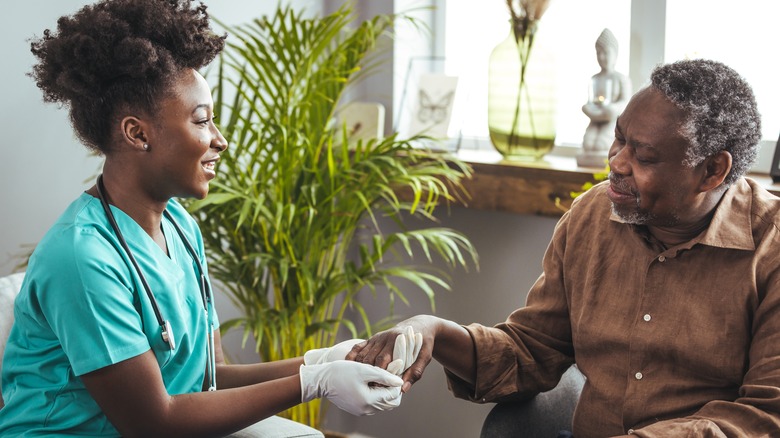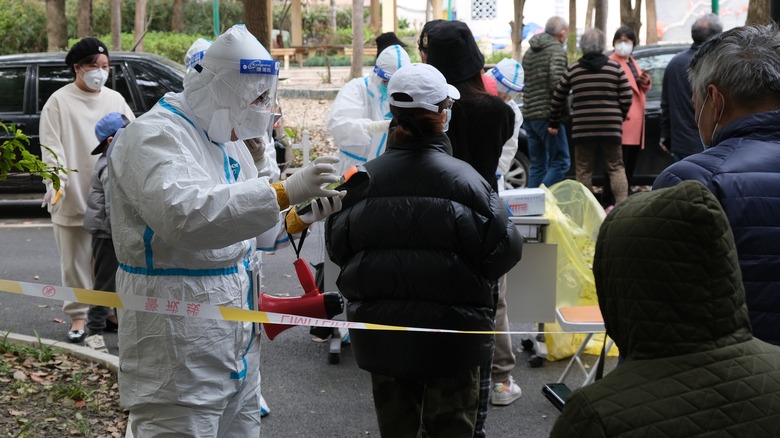LaTanja Silvester On How Community Health Worker Programs Can Bridge Gaps In Health Outcomes - Exclusive
As monkeypox cases rise, cities are already reporting stark racial disparities in how the public health emergency is being handled. Data shows Philadelphia's Black residents comprise 55% of the monkeypox cases, yet only get 23% of the vaccine supply — while the city's white population, at 27% of the monkeypox cases, receives 57% of the vaccine supply (per CBS).
Similar disparities were reported during the peak of the COVID-19 pandemic. According to the Journal of Global Health, structural racism presented barriers that prevented BIPOC from getting the care they needed and resulted in disparate health outcomes.
According to the New England Journal of Medicine, implementing community health workers (CHWs) can be an effective strategy in alleviating health disparities, as they can address the social determinants that especially affect lower-income, BIPOC populations. CHWs live in the regions they serve and use their shared experiences to connect with other community members and educate them on important public health issues. They act as patient advocates and bridge the gap between health professionals and patients by providing valuable resources and communicating important information.
LaTanja Silvester, who leads a CHW program called the New Orleans Resilience Corps, spoke with Health Digest on the effectiveness of the program in New Orleans in reducing health disparities.
How CHWs helped bridge socioeconomic disparities
"[CHWs] have a profound and personal understanding of the residents and their needs, and can thus be more impactful in finding and implementing solutions rooted in equity and sustainability," LaTanja Silvester told us.
Led by Silvester, the New Orleans Resilience Corps was a key public health program that utilized CHWs to deliver critical health services to the city's residents. The CHWs aided with contact tracing efforts, conducted wellness checks, provided information on COVID-19, and offered crucial supplies.
The New Orleans Resilience Force worked with city and state agencies to connect city residents with important resources, including enrolling residents into the Supplemental Nutrition Assistance Program (SNAP). SNAP additionally has a disaster service that provides aid to those who may not normally receive SNAP benefits but suffered from "a loss of income or damages" after a disaster like COVID-19. The New Orleans Resilience Corps also connected residents with an online portal called Unite Us, which provides proactive care based on a resident's particular needs.
CHWs can address medical misinformation
The New England Journal of Medicine reports eight of the 10 ZIP codes in New York City with the most COVID-19-related deaths consisted of lower-income residents who were primarily Black, Hispanic, and Asian. Limited information on COVID-19 and lack of accessible resources compounded the disparate health outcomes. The New Orleans Resilience Corps worked to combat this by going door-to-door and alleviating residents' misconceptions regarding the COVID-19 vaccines.
LaTanja Silvester explained, "Our outreach initiatives were designed to meet residents where they are and to provide the space and listening ear to hear people's concerns." The CHWs employed the "80/20 rule of active listening" — listening 80% of the time to residents' concerns and speaking 20% of the time to address those questions. Silvester says this technique, along with the 96 testing/vaccination drives they hosted, led to an increase in vaccinations.
She noted that the Latinx community was one of the last groups in New Orleans to get access to vaccines. The New Orleans Resilience Corps were able to translate informational material on COVID-19 and hold vaccine drives located in areas where Latinx residents predominantly live, transcending some of the barriers that prevent them from getting access to healthcare.
The program also offered employment to those who found themselves without jobs as a result of the pandemic. "Working closely with community advocates and leaning on the bonds between resilience workers and the people whose lives and communities they help rebuild is key to a successful recovery from any public health disaster," Silvester said.
Learn more about the Resilience Force and The New Orleans Resilience Corps on the Resilience Force website.



